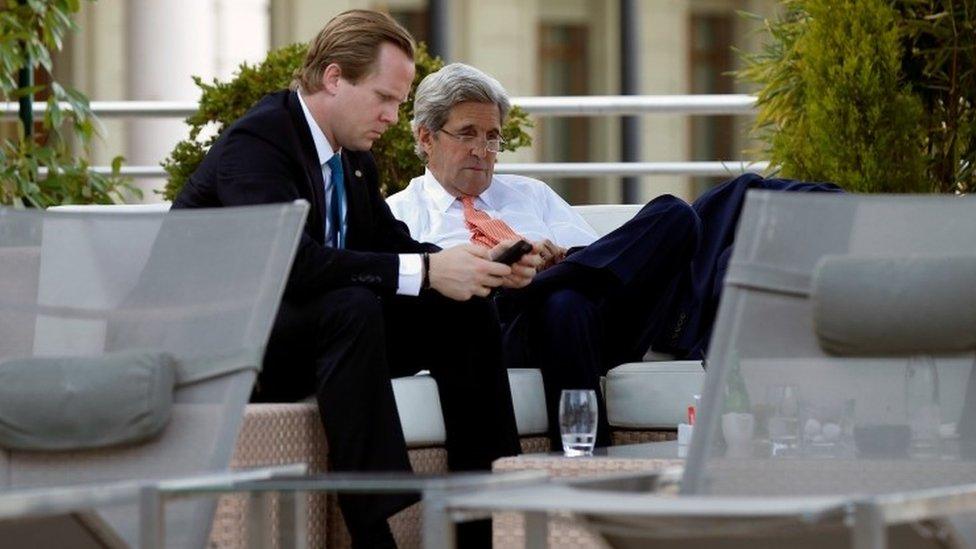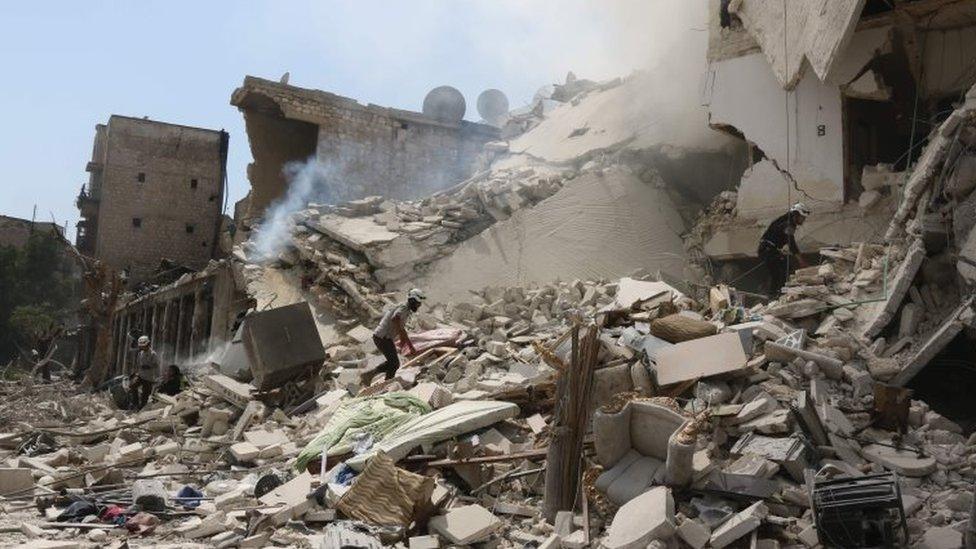Syria war: Ceasefire deal being held up by US, says Russia
- Published

Mr Kerry has been discussing the latest text of a deal with colleagues in Washington
Russia has said agreement on a ceasefire deal in Syria is being held up by the United States.
The two sides have been holding talks in Geneva and the US has said discussions are "making progress".
However, a US official later confirmed that deliberations in Washington were behind delays to a deal.
The latest talks came as the UN special envoy for Syria warned that fuel supplies could run out within days in a rebel-held part of the city of Aleppo.
Fighting has escalated between Syria's army and rebels in eastern Aleppo, where 250,000 people live.
Staffan de Mistura said food and water shortages made the situation there even more serious than previously.
He said a ceasefire deal could make a major difference to aid efforts across Syria.

Fighting between Syria's army and rebels for control of eastern Aleppo escalated in recent weeks
A US state department official said talks with Russia aimed to reach a deal on "a nationwide cessation of hostilities in Syria, as well as sustained and unimpeded access to humanitarian assistance for communities most in need".
Russian Foreign Minister Sergei Lavrov said his officials had been waiting five hours for a response to the latest proposed text of a deal and he was "thinking of calling it a day" until next week.
Mr Lavrov and US Secretary of State John Kerry have been meeting on and off for the past several weeks and the negotiations are clearly proving complicated, the BBC's Imogen Foulkes in Geneva reports.
The US and Russia support opposite sides in the conflict that began in 2011: Washington backs a coalition of rebel groups it describes as moderate, while Moscow is seen as a key ally of Syrian President Bashar al-Assad.
On Sunday, Syrian government forces were reported to have recaptured parts of Aleppo which were lost to rebels last month, placing rebel-held districts in the city's east once again under siege.
A monitoring group said government troops had recaptured two military academy sites in the Ramouseh district, in the south of the city, and severed a recently established rebel supply line.
'Apex of horror'
Aleppo: Key battleground in Syria's civil war
"There is a growing concern about eastern Aleppo: the issue about food, the issue about the possibility that within perhaps the next few days it will turn out to be dark because there is no fuel, problems of water," Mr de Mistura said on Friday.
UN humanitarian chief Stephen O'Brien told the BBC conditions in Aleppo had become appalling: "Eastern Aleppo is at the apex of horror, where anyone of us if we were there would find life barely possible, let alone tolerable."
Mr O'Brien said civilians were trapped in ruined buildings, subjected to daily bombing and shelling.
He described children in the city as a "lost" generation, who had no access to school.
Over the summer the UN's ability to deliver aid across Syria was greatly reduced because of the increased fighting, the UN said.
Little aid was delivered in July, less in August, and none at all so far in September, it added.

Another decade of bloodshed? Analysis by Jeremy Bowen, BBC Middle East editor, Damascus
A ceasefire deal that the Russians and the Americans arranged back in February collapsed quickly in the north but it is still more or less holding, or at least influencing matters, around Damascus.
That does not mean that the war is anywhere near over. A Syrian general at the ministry of defence told me they were well aware that the war in Lebanon a generation ago had lasted 16 years.
This one, he said, was much more complicated so there could be at least another 10 years of bloodshed. The collective tragedy is that so many foreign countries have intervened in the war that it has become much harder to stop.
Syria's war is a big part of the historic change sweeping through the Middle East, and it is tied into other conflicts. Power is shifting, with global repercussions. More tragedies lie ahead.
